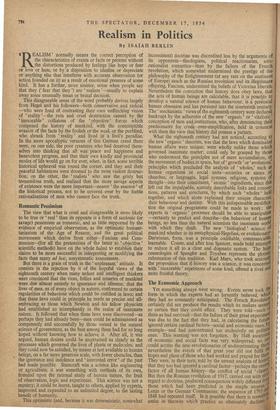Realism in Politics
By ISAIAH BERLIN d EALISM ' normally means the correct perception of the characteristics of events or facts or persons without the distortions produced by feelings like hope or fear or love or hate, or by a disposition to idealise or depreciate or anything else that interferes with accurate observation (or action founded on it) as a result of emotional pressure of some kind. It has a further, more sinister, sense when people say that they (` fear that they ') are realists '—usually to explain away some unusually mean or brutal decision.
This disagreeable sense of the word probably derives largely from Hegel and his followers—bbth conservative and radical —who were fond of contrasting their own unflinching vision of reality '—the ruin and cruel destruction caused by the inexorable' collisions of the objective' forces which composed the history of mankind, with the contemptible evasion of the facts by the foolish or the weak or the purblind, who shrank from reality ' and lived in a fool's paradise. In the more apocalyptic versions of this German creed there were, on one side, the poor creatures who had deceived them- selves into thinking that all was peace and happiness and benevolent progress, and that their own kindly and provincial modes of life would g9 on for ever, when, in fact, some terrible historical upheaval was round the corner, and they and their peaceful habitations were doomed to the most violent destruc- tion; on the other, the. realists' who saw the grisly but tremendous truth, and realised that the more savage aspects of existence were the more important—nearer the essence' of the historical process, not to be covered over by the feeble rationalisations of men who cannot face the truth.


































 Previous page
Previous page